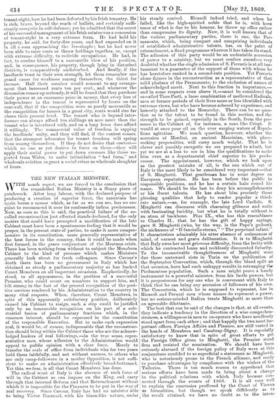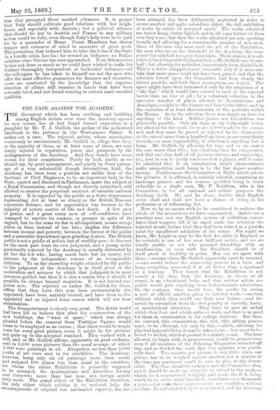THE NEW ITALIAN MINISTRY.
WITH much regret, we are forced to the conclusion that the remodelled Italian Ministry is a flimsy piece of patchwork. After long labour, with the declared purpose of producing a creation of superior force, the mountain has again borne a mouse which, as far as we can see, has no one point to recommend it over its confessedly infirm predecessor. Now, as soon as this is said, the practical failure of the socalled reconstruction just effected stands declared, for the only motive that could have prompted a modification of the late Cabinet must have been a spontaneous feeling that it would be proper, in the present state of parties, to make it more comprehensive in its constitution, more generally representative of the best forces in the country, than it could be made when first formed, in the grave conjuncture of the Mentana crisis. There has been nothing from without to subject the Menabrea Cabinet to the kind of pressure which makes Ministers generally look about for fresh colleagues. Since Cavour's death there has been no government in Italy which has obtained so steady a parliamentary majority as has backed Count Menabrea on all important occasions. Emphatically, he stood, to all appearances, in the position of a successful Premier, who could count on numbers to support him, and felt strong in the fact of the general recognition of the positive services rendered by his Administration to the country in many vital respeets. When, therefore, Count Menabrea, in spite of this apparently satisfactory position, deliberately caused his Cabinet to resign, such a step could be justified only by an honourable recognition on his part of a substantial fusion of parliamentary fractions which, in the common interest, should be expressed in the constitution of the responsible Executive. But to make such expression real, it would be, of course, indispensable that the reconstruction should bring within the Cabinet those who are the acknowledged leaders of real followings,—in the true sense, representative men, whose adhesion to the Administration would appeal to public opinion with a clear force. Merely to transfer the seals of office from individuals who for two years held them faithfully, and not without success, to others who are only camp-followers in a motley Opposition, is not sufficient to make an administration effectively broad-bottomed. Yet this, we fear, is all that Count Menabrea has done.
The radical want of Italy is the absence of such force of will in the Cabinet as can impose on the King, and carry through that internal Reform and that Retrenchment without which it is impossible for the Finances to be put in the way of real recovery. Since Cavour, Italy has had no minister able to bring Victor Emanuel, with his bison-like nature, under
his steady control. Ricasoli indeed tried, and when he failed, like the high-spirited noble that he is, with keen sense of what is due to his honour, he threw up office rather than compromise its dignity. Now, it is well known that of the various parliamentary parties, there is one, the Permanente, which, being compact and comprising individuals of established administrative talents, has, on the point of retrenchment, a fixed programme whereon it has taken its stand. The adhesion of this party would be an undeniable accession of power to a ministry, but we must confess ourselves very doubtful whether the single admission of S. Ferraris is at all tantamount to a guarantee of the support of those with whom he has heretofore ranked in a second-rate position. Yet Ferraris alone figures in the reconstruction as a representative of that solid phalanx of the Permanente, to the exclusion of names of acknowledged merit. Next to this fraction in importance,— and in some respects even above it,—must be considered the so-called Tiers Parti, a loose combination of mellowed Radicals, men at former periods of their lives more or less identified with extreme views, but who have become sobered by experience, and honestly attached to the Monarchy. There can be no question as to the talent to be found in this section, and the strength to be gained, especially in the South, from the presence in the Cabinet of, for instance, a man like Crispi. It would at once pour oil on the ever surging waters of Republican agitation. We much question, however, whether the accession of Mordini, an ancient Mazzinian, with placeseeking propensities, will carry much weight. That he is clever and possibly energetic we are prepared to admit, but yet we are at a loss to see in him the qualifications to make him even as a departmental chief superior to his predecessor. The appointment, however, which we look upon as the greatest mistake of all, is the one which out of Italy is the most likely to be considered very important—that of S. Minghetti. That gentleman has in some degree an European reputation. He has been before the public in responsible positions, and he has a certain halo round his name. We should be the last to deny his accomplishments or his fluent talents. He has about him precisely those pleasing qualities that help to render popular a thirdrate nature,--as, for example, the late Lord Carlisle. S. Minghetti can discourse with charming glibness and write with fascinating lucidity, but what he is totally without is an atom of backbone. Pius IX., who has this resemblance to Charles IL, that he has the gift of happy sayings, gave S. Minghetti (who, by the way, is the Pope's godson), the nickname of "Il fanciullo eterno," " The perpetual infant." It characterizes admirably his utter absence of seriousness of mind, of earnest and grave deliberation. It is to Minghetti that Italy owes her most grievous difficulty, from the levity with which he contracted loans and recklessly discounted futurity. To the inconceivable thoughtlessness of Minghetti weredue those untoward riots in Turin on the publication of the September Convention, which, through the blood spilt on that occasion, have had such unhappy results in estranging the Piedmontese population. Such a man might prove a handy instrument to a powerful minister, from his facile powers, but it is preposterous for any one who is conversant with Italy tothink that he can bring any accession of followers of his own_ TheConsorteria, which he is supposed to represent, has in, Ricasoli and Peruzzi men whose names do represent a power, but no serious-minded Italian treats Minghetti as more than an agreeable dilettante. The best that can be said of the changes is that, at all events, they indicate a tendency in the direction of a wise comprehensiveness, a willingness in men to co-operate who have needlessly stood apart from each other ; and that happily the two most important offices, Foreign Affairs and Finance, are still vested m the hands of Menabrea and Cambray-Digny. It is especially satisfactory to know that in spite of great efforts to get the Foreign Office given to Minghetti, the Premier stood firm and resisted the nomination. We should have been seriously alarmed if the foreign policy of Italy were at this conjuncture confided to so superficial a statesman as Minghetti, who is notoriously prone to the French alliance, and ready to purchase advantages by compliance with the wishes of the Tuileries. There is too much reason to apprehend that serious efforts have been made to bring about a change in the political relations with which Italy became connected through the events of 1866. It is all very well to explain the courtesies proffered by the Court of Vienna as formalities, but though we speak diffidently as to the result attained, we have no doubt as to the Jaen
tion that prompted these marked advances. It is proper that Italy should cultivate good relations with her neighbours, and especially with Austria ; but a political alliance that should tie her to Austria and France in any military action would be folly, even though Italy's help were to be paid for by a surrender of Rome. Count Menabrea has shown temper and calmness of mind in moments of great peril. The patriotism that induced him to take the helm of the State in a terrific crisis, has hal for reward an influence no Italian minister since Cavour has ever approached. If on this occasion he has not done as much as we could have wished to make his Cabinet thoroughly independent of backstairs' influence,—if the colleagues he has taken to himself are not the men who offer the most effective guarantees for firmness and character, —we are comforted by the knowledge that the supreme direction of affairs still remains in hands that have been seriously tried, and not found wanting in certain most essential qualities.































 Previous page
Previous page